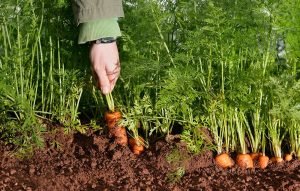I’m glad you’re here. I’ll share some knowledge on carrots🥕 with you today. I sincerely hope that this piece may allay any doubts you may have about carrots🥕. I’ll inform you today about the benefits of When Are Carrots Ready to Harvest.
With our in-depth guide, learn when to pick carrots at their best. Learn how to maximise your carrot yield from planting through picking.
Introduction:
According to my idea With good reason, carrots🥕 are a staple in many gardens. They are simple to raise, adaptable in the kitchen, and nutrient-rich. Knowing when to harvest them, however, can be difficult for both inexperienced and seasoned gardeners. Carrots that are harvested too soon may not produce as well as those that are left in the ground for too long may develop woody or overgrown roots. So, when can I harvest carrots🥕? In this post, we’ll look at the elements that influence carrot maturity and offer advice on how to choose the best moment to harvest your carrots.

When Are Carrots Ready to Harvest watching this video
Factors Affecting Carrot Maturity:
According to my idea The following factors can influence when carrots reach maturity:
Variety: The maturation times of various carrot kinds differ. In contrast to “Danvers” carrots, which may take up to 90 days, “Nantes” carrots are ready to harvest in 60 to 75 days.
Carrots grow best on soil that is between 60 and 65 degrees Fahrenheit. Carrot development may be slowed and maturity delayed if soil temperatures are too low.
Watering: For optimal carrot development, regular watering is necessary. While overwatering might result in root rot and other problems, too little water can cause poor growth and delayed maturity.
Carrots grow best in soil that is both organic matter-rich and well-draining. Growth might be slowed and maturity can be delayed as a result of poor soil quality.
Signs that Carrots are Ready to Harvest:
According to my idea There are a few indicators to watch out for before harvesting carrots to make sure your crop is fully mature. They consist of:
Size: Before being harvested, carrots must have a shoulder diameter of at least 1/2 inch (where the green leaves meet the root). Carrots that are smaller won’t have grown to their maximum size, while those that are larger could be overgrown and woody.
The tops of the carrots should be clearly orange, suggesting that their distinctive colour has formed.
Check the root’s texture by gently pulling the carrot’s🥕 top out of the ground. It should not have any obvious cracks or abnormalities and should be strong and smooth.
Last but not least, sample a few carrots🥕 to make sure they have the right amount of sweetness and flavour.
Tips for Harvesting Carrots:
According to my idea You now know when to harvest your carrots, therefore it’s critical to apply the correct methods to guarantee that your crop is collected and stored correctly. Here are some suggestions to bear in mind:
Employ a fork: When removing the carrots, gently remove the dirt surrounding them using a garden fork or other similar tool to prevent injuring the roots.
Before storing, trim the carrots’ green tops to a height of approximately an inch above the root. The carrots will remain more fresh due to this.
Organize properly: Carrots🥕 should be kept in a dry, dark, and cool environment. This can refer to a refrigerator, root cellar, or other type of storage space.
Usage within a couple of weeks: While carrots🥕 can be kept in storage for a few weeks, they are best used within the first two weeks following harvest.
FAQs:
The variety, soil temperature, and other factors can all affect how long it takes carrots🥕 to mature. Carrots🥕 typically require 60 to 90 days to reach maturity.
It is true that early harvesting of carrots🥕 might lead to lower yields and blander roots. It’s crucial to hold off until they are the right size and colour.
Indeed, overgrown and woody roots can develop in carrots🥕 when they are left in the ground for too long. To achieve the finest flavour and texture, it’s critical to pick them at the proper time.
Carrots🥕 that are overgrown could be hard to cut or peel because of their harsh, woody feel. They might also be deformed or have fissures that are obvious.
Usually, carrot 🥕 roots that are pulled too soon are bland .
The carrots can get bigger still , but their flavor and quality could suffer .
The answer is Yes , you can replant a carrot🥕 after pulling it .
The carrot’s 🥕 dehydration is the cause of its floppiness .
Additional FAQS :
Carrots🥕 tend to change from crisp and crunchy to limp and rubbery if they lose too much water .
Carrots🥕 grow best in an area with full sun🌞 and light, friable soil with a pH between 6.0 and 6.8.
July-Feburary month carrot 🥕is grown .
The tops and leaves of carrots are both edible and non-poisonous .
it occurs as a result of the soil not being loose enough for them to grow in .
Carrots enjoy chilly temperatures and can withstand frost .
When carrots are young, they require approximately an inch of water per week; as the roots get older, the requirement increases to around 2 inches per week .
Conclusion:
According to my idea Knowing when to harvest carrots🥕 is essential for achieving the best possible yield and flavor. By keeping an eye on the signs of maturity, such as size, color, and texture, you can ensure that your carrots are picked at the optimal time. Remember to use proper harvesting techniques and storage methods to keep your carrots🥕 fresh and flavorful for as long as possible. With these tips in mind, you can enjoy the bounty of your carrot🥕 crop all season long.
Thank You For Visit : carrotgudes.com